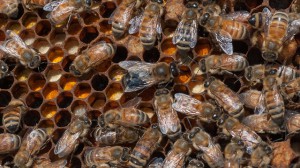Bee population declines could lead to an increase in malnutrition
 Photo credit: U.S. Department of Agriculture
Photo credit: U.S. Department of Agriculture
A recent study published in Proceedings of the Royal Society, Biology has found that maintaining healthy pollinator populations may play an important role in staving off malnutrition in developing countries. Researchers collected data on plant nutrients, crop dependence on pollinators, and crop types and yields across the globe. They found that while pollinators are necessary in 5 to10 percent of global crop production (crops such as wheat and corn are pollinated by wind), they are particularly important for the most nutrient-rich crops such as fruits and vegetables. Researchers found that in developing regions of the world where malnutrition is more prevalent, pollinators were most essential for crops that provided essential nutrients such as vitamin A. This is one of the few studies that indicate a direct link between pollinator health and human health. Researchers recommend that when considering conservation priorities, pollinator health deserves “special consideration in areas where nutritional health is particularly vulnerable, and micronutrient production is especially dependent upon pollination.”


